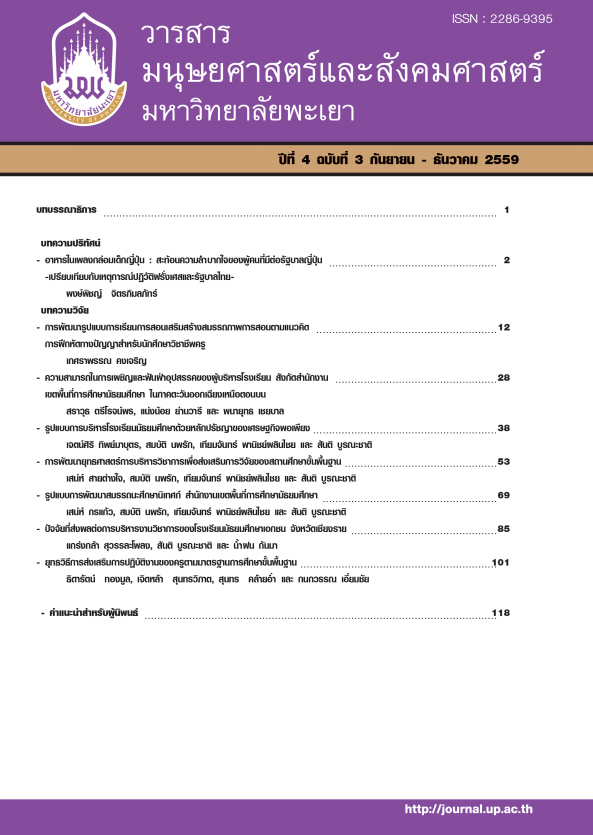Development of a Teaching Competency Enhancement Instructional Model Based on Cognitive Apprenticeships for Student Teachers
Keywords:
Instructional Model, Strengthen Teaching Competencies, Training, Intellectual teacher studentsAbstract
The objectives of this research were to 1) develop a teaching competency enhancement instructional model based on cognitive apprenticeships for student teachers and 2) investigate the quality of a teaching competency enhancement instructional model based on cognitive apprenticeships for student teachers. The design of this research was research and development, which was divided into two phases: (1) the phase of an instructional model development and (2) the phase of an instructional model’s quality investigation. The developed instructional model was implemented to student teachers for one semester to investigate its effects on teaching competency in the second phase. The population was student teachers of the Faculty of Education, Rajabhat University. Purposive sampling was used for selecting the sample, which was consisted of 60 fourth-year-undergraduate students of the Faculty of Education, Chiangrai Rajabhat University. There were 3 research instruments used in this study, which were 1) an understanding of instructional design knowledge and organizing learning activities test, 2) a skills of instructional design knowledge and organizing learning activities evaluation form, and (3) an attitude towards teaching profession test. The collected data was analyzed by using mean ( ) standard deviation (s) and t – test. The results of this study were as follows.
- The developed teaching competency enhancement instructional model was consisted of 3 phases. The first phase was teacher and model’s preparation phase, consisting of 3 preparation procedures: (1) course outline and modeling settling, (2) role of modeling and teacher on instruction settling, and (3) roles and tasks of students on learning and practices settling. The second phase was teacher students’ knowledge constructing phase, consisting of 4 learning procedures: (1) observing, (2) knowledge constructing, (3) implementing, and (4) learning reflection. The third phase was student teachers’ performing phase, consisting of 2 performing procedures: (5) teaching practices and (6) evaluating.
2) The effects of this developed instructional model on the teaching competency enhancement of student teachers were as follows: The sample
2.1. The sample groups’ mean scores on instructional design knowledge and learning activity organizing were higher than the control groups at .05 level of statistical significance.
2.2. The sample groups’ mean scores on skills of instructional design knowledge and learning activity organizing were higher than the control groups at .05 level of statistical significance.
2.3. The sample groups’ mean scores on attitude towards teaching professions were higher than the control groups at .05 level of statistical significance.
References
คณะอนุกรรมการการพัฒนาหลักสูตรครุศาสตรบัณฑิต. หลักสูตรครุศาสตรบัณฑิต (5 ปี) ราชภัฏ. กรุงเทพฯ: สถาบันราชภัฏสวนสุนันทา; 2545.
ทิศนา แขมมณี. ศาสตร์การสอน: องค์ความรู้เพื่อการจัดกระบวนการเรียนรู้ที่มีประสิทธิภาพ. กรุงเทพมหานคร: โรงพิมพ์แห่งจุฬาลงกรณ์-มหาวิทยาลัย; 2545.
สำนักงานคณะกรรมการกฤษฎีกา. คู่มือผู้ประกอบ วิชาชีพทางการศึกษา. กรุงเทพมหานคร: คุรุสภา, 2547.
สำนักงานคณธกรรมการการศึกษาแห่งขาติ. การปฏิรูปการศึกษาไทย. กรุงเทพมหานคร: 21 เซ็นจูรี่; 2545.
สำนักงานปฏิรูปการศึกษา. ทำไมการปฏิรูปการศึกษาต้องทำทั้งระบบ. พิมพ์ครั้งที่ 2. กรุงเทพมหานคร: ศิริการพิมพ์; 2545.
สำนักงานสภาราชภัฏ. สรุปผลการศึกษาวิจัยแนวทางการพัฒนาหลักสูตร การฝึกหัดครูของสถาบันราชภัฏ. กรุงเทพมหานคร: เสมาธรรม; 2545.
Blanchard & Thacker. Social foundations of thought and action: A social cognitive theory. New Jersey: Prentice Hall; 2004.
Bransford, Brown & Cocking. Classroom Instructional and Management. New York: McGraw-Hill Companies; 2000.
Ghefaili. Educational Psychology: developing learners. 3 rd ed. New Jersey: prentice Hall; 2003.
Haggarty. Educational Psychology: Theory and Practice. Fourth Edition. Needham Heights: Allyn and Bacon; 2002.
Hein. A Pedagogy for Liberation: Dialogues on Transforming Education. Massachusetts: Bergin & Garvey; 2002.
Joyce, B. & Weil, M. Models of teaching. Englewood Cliffs, NJ: Prentice-Hall; 2002.
Lickona, Schapps, and Lewis. A Curriculum planning for better teaching and learning. New York: Holt, Reinhart and Winston; 2002.
Vygotsky, L. S. Mind in Social: The Development of Higher Psychological Process. Cole, Micheal and others. Editors. Cambridge: Haward University Press; 1977.
Zimmerman, B, J. Self- regulation in education in education: Retrospect and prospect. In Self – regulation of learning and performance. Issues and educational application. New Jersey: Lawrence Erlbaum Associates; 1994.
Downloads
Published
How to Cite
Issue
Section
License
ผู้นิพนธ์ต้องรับผิดชอบข้อความในบทนิพนธ์ของตน มหาวิทยาลัยพะเยาไม่จำเป็นต้องเห็นด้วยกับบทความที่ตีพิมพ์เสมอไป ผู้สนใจสามารถคัดลอก และนำไปใช้ได้ แต่จะต้องขออนุมัติเจ้าของ และได้รับการอนุมัติเป็นลายลักษณ์อักษรก่อน พร้อมกับมีการอ้างอิงและกล่าวคำขอบคุณให้ถูกต้องด้วย
The authors are themselves responsible for their contents. Signed articles may not always reflect the opinion of University of Phayao. The articles can be reproduced and reprinted, provided that permission is given by the authors and acknowledgement must be given.








